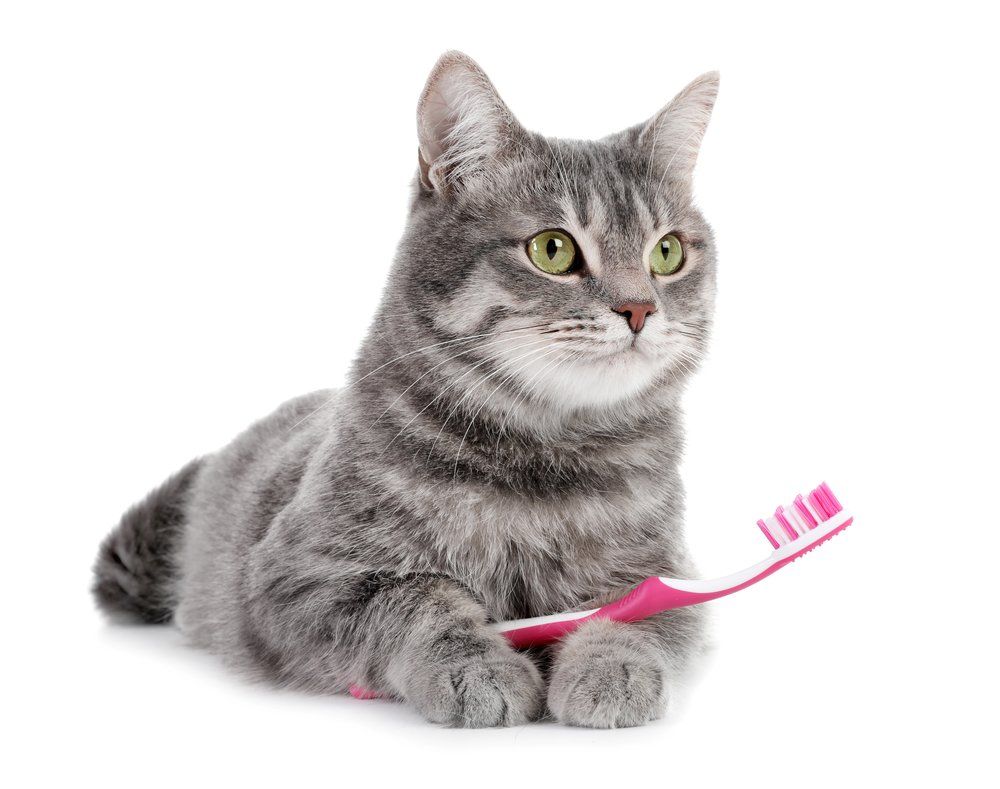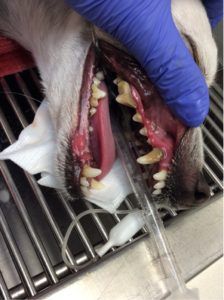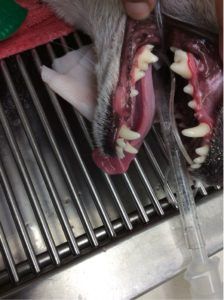Pet Dental Care

Pet Dental Care Little Rock
Dental care and regular oral hygiene is an important part of caring for your pet that often gets overlooked. If you’ve not been paying attention to your dog or cat’s teeth, don’t feel guilty. More than two thirds of all pet owners are in the same boat. However, you should know that taking action now (even if your pet is an adult) can improve their overall health, and even help them live longer.
If you haven’t given a thought to brushing your pet’s teeth or having their teeth professionally cleaned, you aren’t alone. In fact, an estimated 85% of all pets have some level of periodontal disease by the age of three, which could be avoided with better dental care.
Why Your Pet Needs Dental Care
Aside from the obvious – a clean mouth smells better – there are several important reasons to have your pet’s teeth checked and cleaned regularly:
- Dental disease is the #1 ailment affecting pets. It can lead to trouble with the heart, kidneys, and liver – built up bacteria associated with periodontal disease can travel through the body and affect their organs, which can shorten their lifespan by 20%.
- Dogs and cats are good at masking pain, without a dental checkup, you may not know your pet has a painful problem until it is severe.
- 4 out of 5 dogs and cats have periodontal disease by age 4, and smaller breed dogs and those with short noses are even more susceptible to disease! Proper care from puppy or kitten stages on can help prevent tartar buildup and periodontal disease.
What Are Some Signs Of Dental Problems In Cats And Dogs?
While it is recommended to brush your pet’s teeth daily, we know that may not be realistic for every family. Brushing a few times a week, even once a week is better than not at all.
Even if you don’t brush your pet’s teeth religiously, you should at least check in on their mouth to see what’s going on. If you see a brownish-golden colored buildup on the teeth (tartar), redness along the gumline, or bleeding gums, that may be indicative of dental disease. If you notice any of these signs, please make an appointment with Shackleford Veterinary Clinic (SRVC) as soon as possible. Some other things to watch out for are:
- Noticeably bad or worse than usual breath
- Pawing at the mouth or rubbing their mouth on the floor/furniture
- Excessive drooling
- Tilting head to one side when chewing (favoring chewing on one side)
- Blood on chew toys
- Problems chewing or refusal of food
- Missing or loose adult teeth


What Happens During a Pet Dental Cleaning?
In many ways, a pet dental cleaning is very similar to your own dentist appointment. The teeth, tongue, gums, and general bone structure are inspected and assessed for any problems, and then a thorough teeth cleaning is performed to remove plaque and tartar buildup.
The big difference is, your pet will have to be put under general anesthesia to comfortably and thoroughly clean their teeth. General anesthesia allows the veterinarian to safely and thoroughly remove tartar from the teeth and below the gums without causing the animal undue stress.
Before we proceed with a teeth cleaning, we will do a blood test to be sure there are no underlying issues that would prevent your pet from safely undergoing anesthesia. While your pet is under anesthesia, a flexible, soft plastic tube will be placed in the trachea to not only support your pet’s breathing, but also help prevent them from inhaling the bacteria that will be floating in the air as it is removed from the teeth. Some of the procedures that may be involved in your pet’s dental cleaning procedure may be:
- Inspection of the lips, tongue, and other soft tissue for any growths or signs of other trouble
- Probing gums to assess health and level of disease if applicable
- Charting of teeth and indication of problem areas for monitoring
- Dental x-rays to evaluate issues below the gumline and with the bone structure
- Removal of plaque and tartar from tooth surfaces with an ultrasonic scaling tool, and from below the gumline manually
- Removal or repair of broken, loose, or infected teeth
- Polishing teeth (a slick surface makes it more difficult for plaque to stick!)
- Fluoride and/or sealant application
What Our Clients Say
C. Mayfield
I have seen a lot of changes since I have been a client at Shackleford Veterinarian Clinic since 1996. The best change of all was when Dr. Barron started. You will not find a better veterinarian or staff!
Tiffany Williams
SRVC answered all of my questions and even allowed me to come back after my appointment to update and add information to my pet's health certificate. I would highly recommend this vet to anyone. They go above and beyond expectation.
Ashley Hurst
I will forever be thankful that Dr. Barron was recommended by my neighbor! My pets have been treated at several different veterinary clinics, but no one
has ever compared to Dr. Barron. The front desk staff and vet techs could not be kinder!
Why Choose Shackleford Veterinary Clinic For Your Pets Dental Needs?
Your pet’s dental health is important to their overall health. During your pet’s routine checkup at our Little Rock animal hospital, we will carefully examine their teeth and gums. Next, we will answer any dental health questions you may have. If your pet requires a cleaning, we will then schedule an appointment to perform the cleaning.
Our experienced veterinarians and vet technicians on staff understand that your pet is more than just an animal that lives with you, they are part of your family. We have been serving the pets and owners of Central Arkansas for over thirty years with quality and comprehensive care, and we are proud to call ourselves “your other family doctor.”
You can request an appointment here, we look forward to serving your family!




